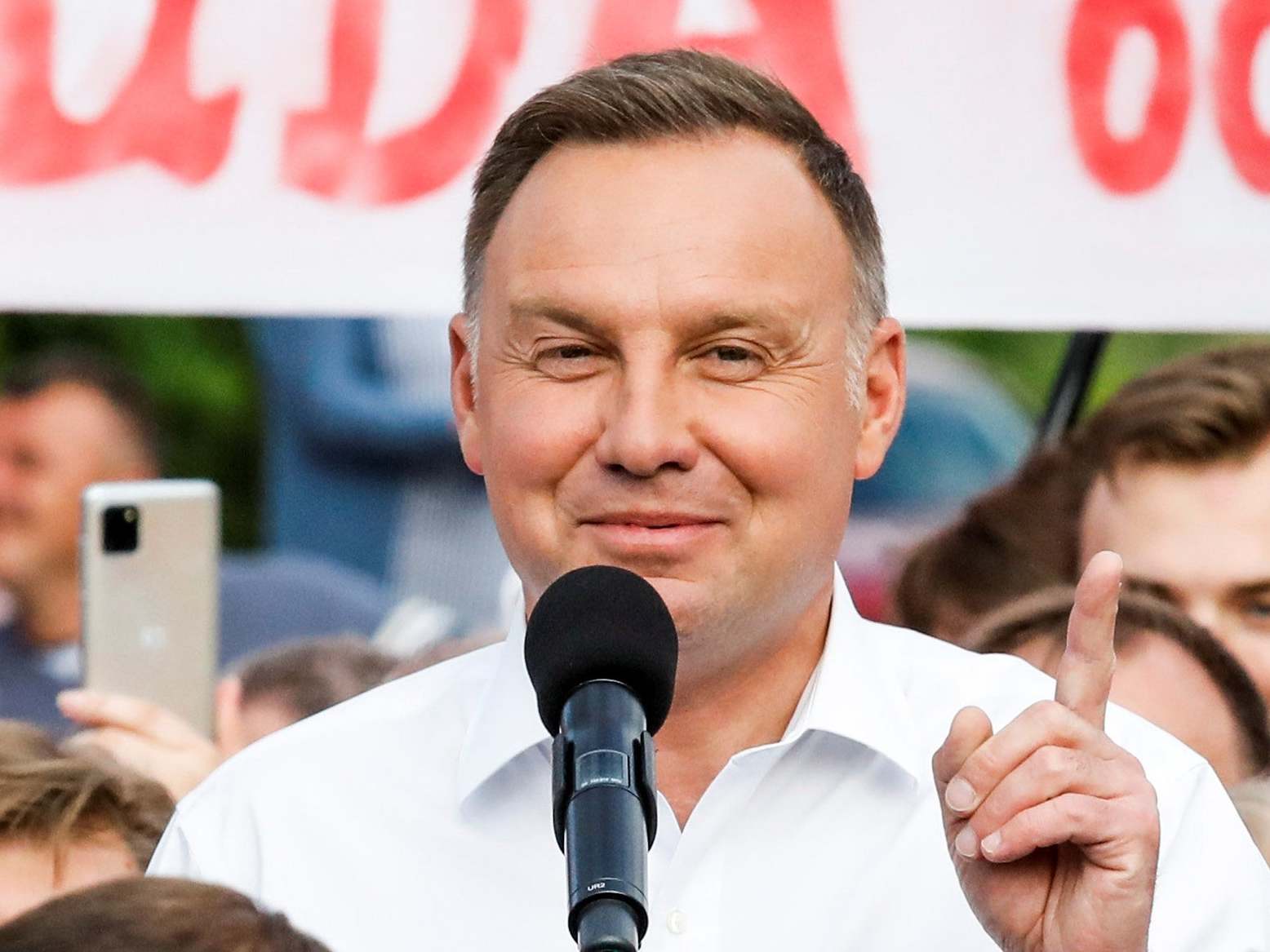Boris Johnson has congratulated Duda's Polish victory. Let's hope other EU leaders speak out
The tropes of foreign penetration, enemies within to be guarded against, if not eliminated, and the scapegoating of entire categories of citizens – these have all become part of public discourse in Poland, write Luiza Bialasiewicz and Andrea Mammone


Your support helps us to tell the story
From reproductive rights to climate change to Big Tech, The Independent is on the ground when the story is developing. Whether it's investigating the financials of Elon Musk's pro-Trump PAC or producing our latest documentary, 'The A Word', which shines a light on the American women fighting for reproductive rights, we know how important it is to parse out the facts from the messaging.
At such a critical moment in US history, we need reporters on the ground. Your donation allows us to keep sending journalists to speak to both sides of the story.
The Independent is trusted by Americans across the entire political spectrum. And unlike many other quality news outlets, we choose not to lock Americans out of our reporting and analysis with paywalls. We believe quality journalism should be available to everyone, paid for by those who can afford it.
Your support makes all the difference.Sunday’s presidential elections in Poland represent another blow for liberal democratic values in Europe. They also present EU leaders meeting later this week at a special summit of the European Council with yet another existential challenge: how should Union institutions respond to an electoral contest that violated most of the EU’s stated – and legally inscribed – principles and norms?
The victory of the right-nationalist candidate Andrzej Duda should concern Brussels for a number of reasons. The electoral campaign of the incumbent president explicitly drew on far-right, if not directly fascist, tropes, made wide use of antisemitic rhetoric and launched a virulent attack against LGBTQI “ideology”. Duda ably wove together a myriad of popular anxieties in his electoral propaganda, from the economic to the cultural, depicting a Poland under attack from external threats, whether those of global capital or uncontrolled migration, or those represented by “internal enemies”: Jews, homosexuals, and foreign-controlled journalists.
In all its virulence, the campaign of the governing Law and Justice (PiS) was, nevertheless, the more “presentable’” face of a climate of hate stoked by groups to the even farther right. The Warsaw-based leading anti-racist organisation Never Again, in its annual “Brown Book” published in May, chronicled a staggering rise in attacks against opposition politicians, Jewish figures, or those reputed to be, LGBTQI individuals and ethnic minorities.
Given this climate, contender Rafal Trzaskowski’s 48.97 per cent result was in many ways incredible. It was incredible not just in the context of the months-long campaign of defamation and hate-mongering, but also of blatant media manipulation. The PiS used every means to make anything even resembling a level electoral playing field impossible. The media became the favoured target in this election period, decried as having an anti-government bias but, especially, as governed by “foreign interests and ideas”.
Duda in fact refused to take part in a televised debate with Trzaskowski, stating that these were “staged by foreign media”.
The tropes of foreign penetration, enemies within to be guarded against, if not eliminated, the scapegoating of entire categories of citizens – these have all become part and parcel of public discourse in Poland over the past months, a polarisation strengthened by the Covid-19 pandemic, which gave even more impetus to fanciful conspiracy theories that further fed ideas of Polish demise and sinister external forces. Attacks on journalists, activists, academics and opposition politicians are by now a daily occurrence, derided as “Polish-haters” and foreign spies also on state TV broadcasts.
The problem, however, does not lie only in Poland. Central Eastern Europe is becoming both a role model and a magnet for the international far right, white nationalists and xenophobic groups. Countries like Hungary and Poland are also becoming safe zones and laboratories for exclusionary and right-nationalist political regimes, still based ostensibly on elections and formal democratic procedures but reversing the rule of law, independence of the judiciary and media freedom.
In November 2017, thousands of far-right nationalists, including notorious British extremist Tommy Robinson, leading Canadian and US alt-right members, as well as Southern European neo-fascists, met in Poland calling for the re-constitution of a “White Europe”. The event took place on Polish Remembrance Day and despite the outrage of foreign media at the march’s chants of “Jews out of Poland” and “refugees get out”, it was defended by the Polish foreign minister of the time as a patriotic celebration. The progressive monopolisation of Central European politics by a demagogic far-right that blends old-style anti-Semitism and nostalgic nationalism with more contemporary anti-migrant and anti-EU slogans has, in fact, been in the making for quite a few years by now.
If a Brexiter such as Boris Johnson welcomed Duda’s re-election by tweeting: “The UK and Poland have a long, shared history and friendship in Europe, NATO and elsewhere. I look forward to that continuing as we face the challenges and opportunities ahead”, the challenge is now open for other Europeanist leaders to respond in appropriate fashion to the confirmation of a candidate and a party that is clearly opposed to the Union’s basic principles.
The old continent is witnessing the emergence of a number of divides. The process of the de-democratisation of some of the Central and Eastern European states is certainly led by a “new authoritarian elite”, but it is also made possible by the limitations of a truly “European politics”, only highlighted by the Covid-19 crisis.
The pandemic emergency has showed an additional north-south divergence characterised by the narrow approach of some EU members who have thus far defied economic solidarity in the name of national interests. They are ready to reject the coronavirus recovery plan, not very subtly blaming the hardest hit southern European countries for their fate, while at the same time unwilling to take a stand when European democracy is under threat.
If the leaders at this week’s EU Summit wish to rescue something resembling a shared European project, they must be willing to forego choosing economic considerations over democratic principles, and silence and hypocrisy over fundamental values.
Andrea Mammone is a visiting fellow in the Robert Schuman Centre at the European University Institute, and a historian of Modern Europe at Royal Holloway, University of London. Luiza Bialasiewicz is a Jean Monnet professor of EU external relations in the department of European studies at the University of Amsterdam
Join our commenting forum
Join thought-provoking conversations, follow other Independent readers and see their replies
Comments